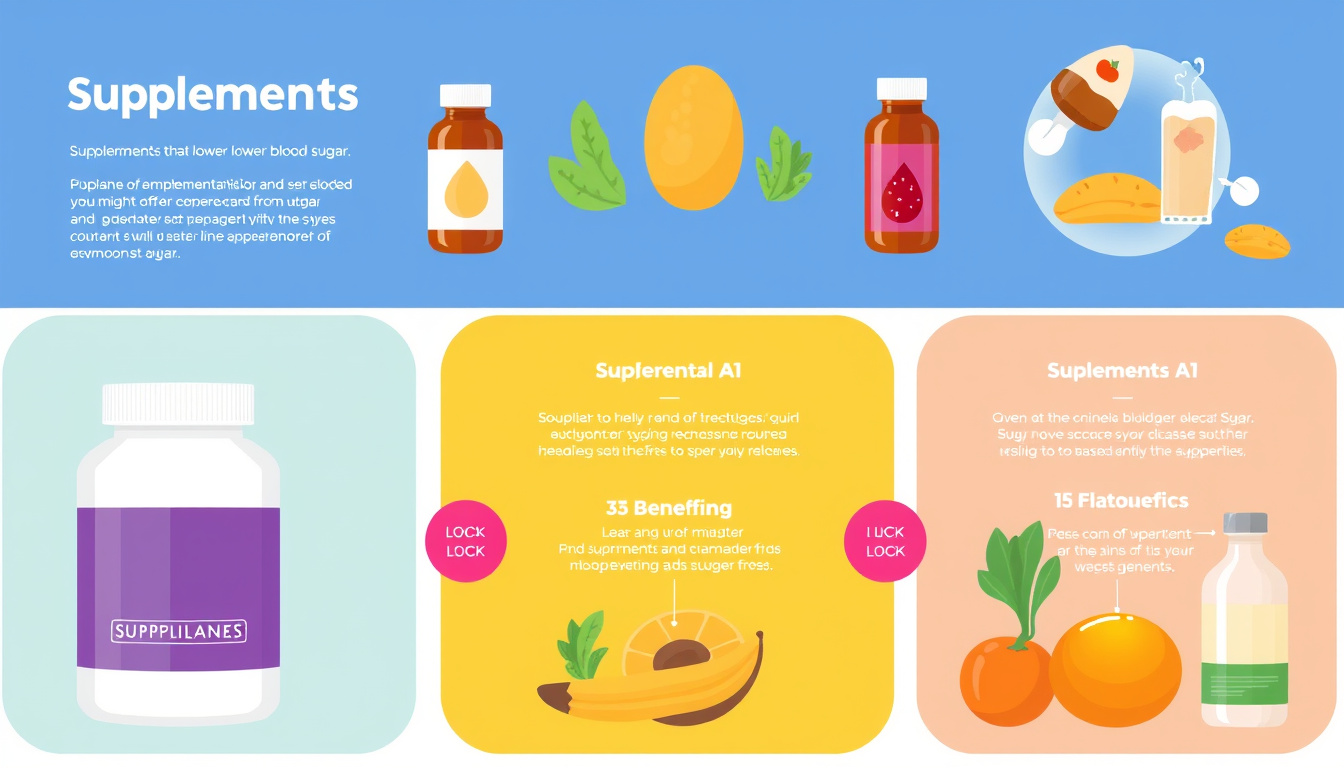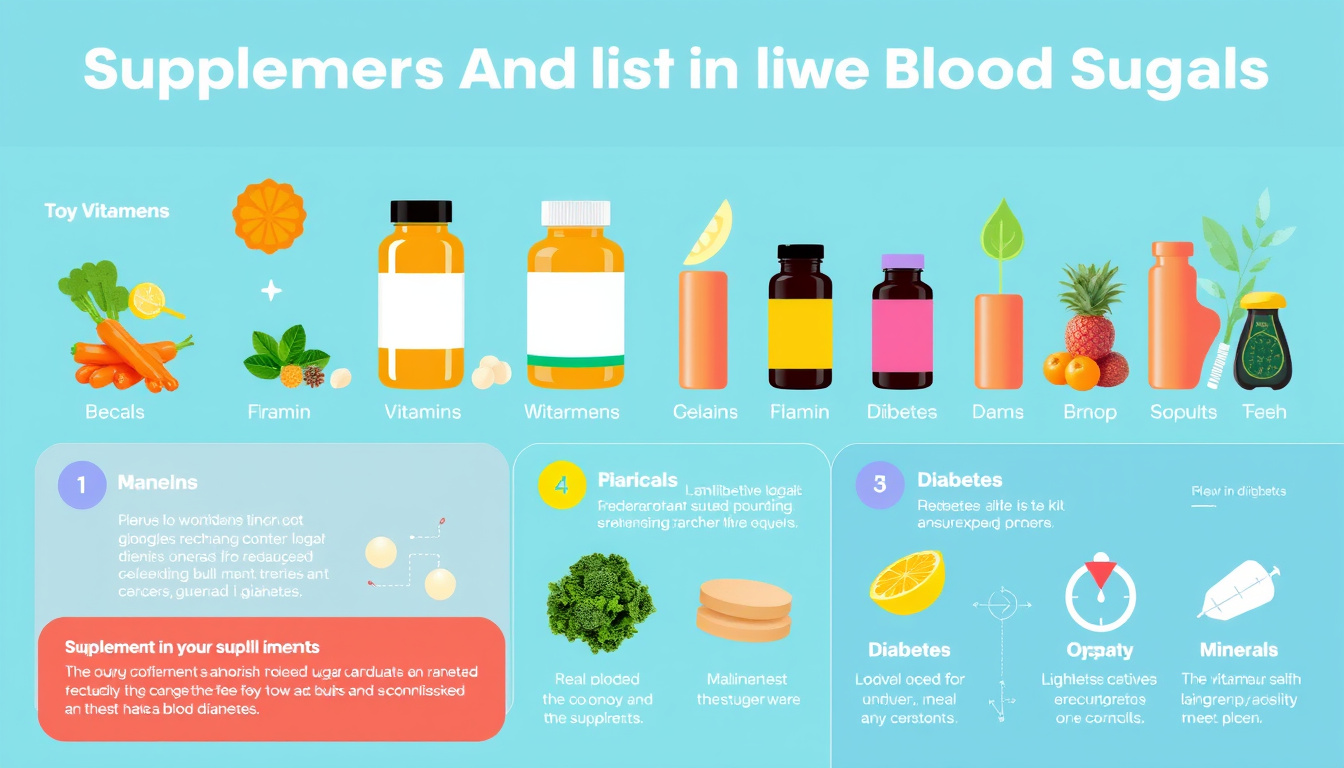Unlocking Better Health: The Ultimate Guide to the Best Supplements for Lowering Blood Sugar
 Jill Smith
Jill Smith
Maintaining healthy blood sugar levels is crucial for overall well-being, especially for individuals with prediabetes or type 2 diabetes. Along with a balanced diet, regular exercise, and prescribed medical treatments, certain dietary supplements may offer additional support in managing blood glucose. This comprehensive guide explores some of the best supplements that research suggests could help lower blood sugar levels effectively and safely.

Understanding Supplements and Blood Sugar Control
Before diving into specific supplements, it’s important to recognize that while many dietary supplements show promise for glycemic control, the quality of evidence can vary. Supplements are typically not regulated as strictly as medications, which means their potency and purity can differ between products. Consulting healthcare professionals before starting supplements is essential, especially to avoid interactions with prescribed diabetes medications.
Top Supplements to Support Blood Sugar Management
1. Cinnamon
Cinnamon comes in multiple species, including Cinnamomum cassia and Cinnamomum zeylanicum (true cinnamon). It has been widely studied for its potential to improve insulin sensitivity and lower fasting blood glucose. Some meta-analyses indicate cinnamon may reduce fasting blood sugar by an average of about 19 mg/dL, though effects on long-term markers like HbA1c are less conclusive. Use caution with Cassia cinnamon due to its coumarin content, which can harm the liver in large amounts.
2. Berberine
Berberine is a bitter alkaloid derived from plants like goldenseal and barberry. Strong research, including meta-analyses, shows berberine can significantly reduce fasting blood glucose without causing hypoglycemia. Some users experience gastrointestinal side effects, so gradual introduction and medical oversight are advised.
3. Nigella sativa (Black Seed)
Traditionally used in Middle Eastern and Southeast Asian medicine, Nigella sativa has demonstrated beneficial effects on blood glucose regulation and serum lipid profiles in people with diabetes. Clinical studies suggest doses around 1 gram twice daily of black seed powder can be effective over several months.
4. Ginseng
North American and Asian ginseng varieties have been associated with improved post-meal blood sugar control. However, ginseng can interact with immunosuppressants and blood thinners, warranting cautious use under medical supervision.
5. Magnesium
Magnesium plays a vital role in insulin secretion and action. Deficiency is common in people with type 2 diabetes and may contribute to poor glycemic control. Supplementation has been shown to improve fasting glucose and lipid profiles and may reduce cardiovascular risk factors linked to diabetes.
6. Alpha-Lipoic Acid (ALA)
ALA is a powerful antioxidant produced naturally in the body and available as a supplement. It can reduce oxidative stress caused by high blood sugar and may improve fasting glucose and HbA1c over time. ALA is also used to alleviate symptoms of diabetic neuropathy.
7. Vitamin D
Vitamin D deficiency is a recognized risk factor for type 2 diabetes. Supplementation could enhance pancreatic beta-cell function and insulin sensitivity. However, vitamin D should be supplemented carefully as it may interact with various medications.
8. Gymnema Sylvestre
An herb from Ayurvedic medicine, Gymnema may reduce intestinal sugar absorption and lower fasting blood glucose by measurable amounts. It also enhances insulin’s blood sugar-lowering effects, so co-use with insulin therapy requires medical oversight.
9. Probiotics
Gut microbiota imbalances can increase diabetes risk. Probiotics, containing beneficial bacteria, may improve carbohydrate metabolism and glycemic control by restoring a healthy gut environment. They are generally safe but should be used cautiously in people with compromised immunity.
10. Chromium
Chromium is essential for carbohydrate metabolism. Deficiency may raise insulin needs, and supplementation can enhance insulin action. Certain medications, including antacids, can reduce chromium absorption, so healthcare consultation is important before use.
What the American Diabetes Association Says
The American Diabetes Association (ADA) currently states that supplements are not proven to effectively lower blood sugar or manage diabetes unless there is an underlying nutrient deficiency. They recommend:
- Using supplements only under healthcare provider guidance.
- Considering supplements like multivitamins for at-risk groups, such as pregnant women, older adults, vegetarians, or those on restrictive diets.
- Prioritizing whole foods over pills for better nutrient absorption and overall health benefits.
Safety and Considerations
- Interactions: Many supplements can interact with diabetes medications, potentially causing blood sugar to drop too low (hypoglycemia) or interfere with drug effectiveness.
- Quality: Choose supplements with established quality seals such as the United States Pharmacopeia (USP).
- Medical Supervision: Always discuss supplements with your healthcare team before starting, especially if you have other health conditions or are pregnant.
Conclusion: Supplements as an Adjunct, Not a Replacement
While certain supplements show encouraging evidence in supporting blood sugar management, they should never replace prescribed diabetes treatments or lifestyle adjustments. Instead, they can be considered complementary when tailored to your individual health needs and used responsibly under professional supervision. Prioritize balanced nutrition, regular physical activity, and medical care as the foundation of diabetes management.
References & Further Reading
- Whole Health Library, U.S. Department of Veterans Affairs: Supplements to Lower Blood Sugar
- Healthline: 10 Supplements That May Help Lower Blood Sugar
- American Diabetes Association: Vitamins, Minerals, and Supplements for Diabetes
- Cochrane Reviews and Systematic Meta-Analyses on Supplement Efficacy in Glycemic Control
By understanding the potential benefits and precautions associated with these supplements, you can make informed decisions to support your journey toward better blood sugar control and overall health.
Turn Back the Clock: Unlock the Secrets to Reverse Diabetes in 30 Days. Don't Wait! Download Now
Subscribe to my newsletter
Read articles from Jill Smith directly inside your inbox. Subscribe to the newsletter, and don't miss out.
Written by
